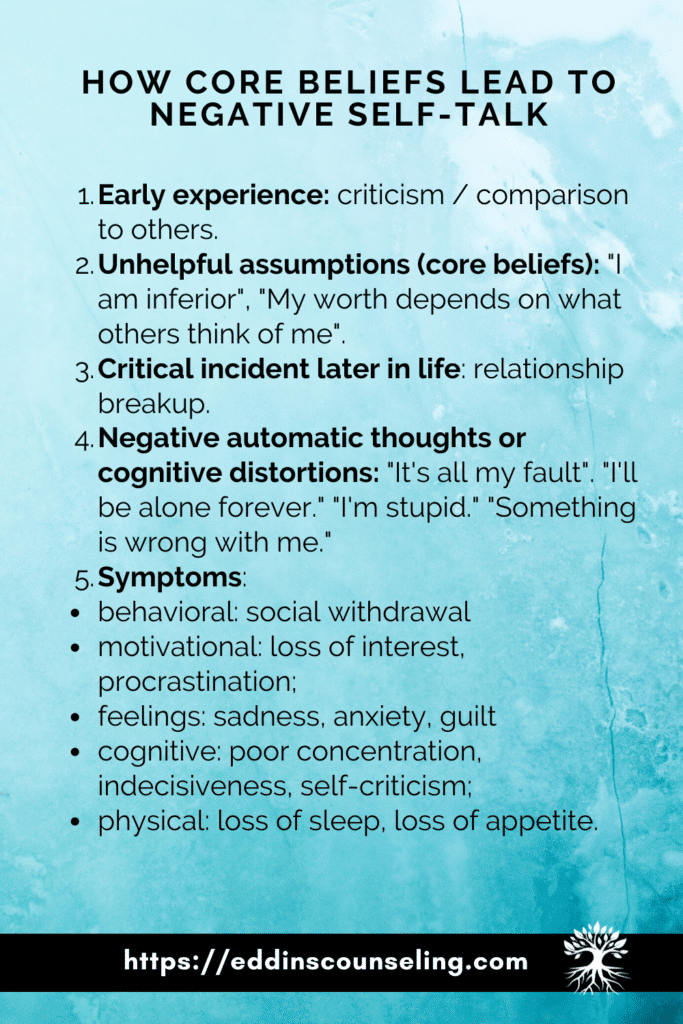August 25, 2014
Uncover Your Core Beliefs so You Can Change Them
Written by Rachel Eddins
Posted in Anxiety, Depression, Emotional & Mental Health, Tools & Exercises and with tags: cognitive-behavior therapy, journal exercises, negative self-talk

What Are Core Beliefs?
Core beliefs are deeply buried assumptions that guide our behavior, how we see ourselves and perceive situations. These beliefs impact how we feel, how we relate to others and guide our success and satisfaction with life and relationships.
Core beliefs are just that, core to our identity. They can feel as a deeply entwined as our gender or our name.
If you think about having a different name, it just doesn’t feel right. The same is true with our beliefs, we’ve worn them for so long that adopting new beliefs doesn’t feel right, thus it takes time to change.
Our core beliefs feel like truths and can be challenging to alter. They are responsible for our continual insecurity, self-doubt, low moods and constant desire for external validation and approval.
They can lead to ineffective behavioral patterns such as people-pleasing and perfectionism. We also notice events and situations that confirm our core beliefs and ignore those that go against our core beliefs.
Beliefs are like our inner “walls” that have no doors and restrict us from experiencing new possibilities in life. It’s important to remember that core beliefs aren’t facts.
How Do Core Beliefs Develop?
Beliefs are nothing but thoughts that we affirm to ourselves over and over and which we take to be true. A belief can consist of a very simple thought such as “Life is hard”, or it can be a complex array of thoughts and statements such as in a belief system.
Whether you are aware of it or not you are always affirming what you believe.
In fact, if you really listen to yourself you are continually making a case for the ‘rightness” of your beliefs even when those beliefs are detrimental to your happiness and well-being!
Your “inner lawyer” is continually justifying and being “right” while making other beliefs “wrong”. The way to keep a belief system going is to continually affirm it and justify it and never question it.
Core Beliefs Impact Our Happiness in Life
We have developed core beliefs in every area of our life and these beliefs impact our happiness, success, and personal fulfillment. We form core beliefs as a way to understand and live in the world around us.
Beliefs are nothing more than thoughts that over time we come to believe as true. However, they are often developed based on our early experiences, which for many people don’t reflect what is actually “true”.
Because they feel so real and so true, they can be very strong forces in shaping our perceptions and difficult to change.
Core Beliefs Can Lead to Negative Automatic Thoughts
This is an example from cognitive behavioral therapy of how core beliefs formed early in life lead to negative self-talk later in life. The negative self-talk then contributes to unhelpful behaviors and symptoms.
Negative self-talk often contains cognitive distortions. It’s helpful to learn to recognize cognitive distortions so you can challenge unhelpful thinking that leads to problematic symptoms.
See below for the how the cycle works:
- Early experience – criticism / comparison to others.
- Unhelpful assumptions (core beliefs) – “I am inferior”, “My worth depends on what others think of me”.
- Critical incident later in life – i.e, relationship breakup.
- Negative automatic thoughts or cognitive distortions – “It’s all my fault”. “I’ll be alone forever.” “I’m stupid.” “Something is wrong with me.”
- Symptoms – behavioral: social withdrawal; motivational: loss of interest, procrastination; feelings: sadness, anxiety, guilt; cognitive: poor concentration, indecisiveness, self-criticism; physical: loss of sleep, loss of appetite.

Examples of How Core Beliefs Develop
Let’s say that as a child you shared your feelings and emotions with your parent who consistently told you that you were “wrong.” Perhaps they did so in a very well-meaning way.
If you said, “I don’t feel like I fit in and I’m scared the other kids don’t like me.” Your parent may have not wanted you to have these negative thoughts and feelings and simply said “you’re wrong, that’s not true.”
When this happens over and over with each negative emotion you experience, over time you may develop a belief that you’re wrong, you can’t trust yourself and you can’t trust your emotions.
If you believe at a fundamental level that you’re wrong, you might find it difficult to express yourself assertively, to feel worthy or deserving, or to trust yourself. The belief then drives many different aspects of your life.
If adults mistreated you as a child you may have formed the belief, “I am not safe.” As a child it makes sense to draw this conclusion and it also protects you from trusting other adults who may also mistreat you.
However, as an adult this belief can limit you from creating connections and trusting others. In actuality, the truth may have been more realistically, “I can’t trust my father (vs adults) to protect me or care for my needs”.
Why Uncover Your Core Beliefs?
If you’ve ever felt stuck in a pattern that you keep repeating, a behavior you want to change (such as addiction, overeating), or feelings and perceptions of others then you’ve likely got a core belief running the show.
For example, If you have a core belief, “the world is not safe, I cannot trust others”, then you might feel anxious, have difficulty forming or maintaining relationships, and have habits or behaviors that can be exhausting such as poor boundaries, obsessive thinking, compulsive behaviors, or perfectionism.
As you can imagine, you might never really notice the connection between your anxiety and a deeply embedded belief that the world is not safe. You just notice that you feel anxious!
This is why it’s so important to identify your core beliefs.
It helps you to start to make the connection between your beliefs and how you’re feeling. It gives you an opportunity to take a step back and look at the situation in a different way.
You can challenge the belief and remind yourself that you are safe, right now, which can help you to shift your focus from the anxiety to what action needs to be taken and get present in the moment.
Negative Core Beliefs Can Lead to Self-Sabotage
Another example might show up in your career or in relationships. Let’s say you are working towards a career dream that you have.
However, you notice that as you take steps towards your career goal, you find yourself sabotaging your success, procrastinating, feeling anxious and avoiding what you need to do. You might wonder “what’s wrong with me! Why do I keep stalling? I want this goal!!”
What you might not realize however, is that you are carrying a deep belief that you don’t deserve success, others will find out that you’re a fraud, or that achieving success will involve having to maintain more than you can handle.
Again, these aren’t thoughts we are aware of on a daily basis. What you might notice instead while working on your dream career is, “I need to take a break,” “Maybe I should update my resume again.”
You’re not thinking, “I’m not worthy, I can’t have what I want”, though this could be the core belief running the show. Uncovering your core beliefs helps you to take charge of your life.
To recognize the unconscious forces that drive your thoughts and behavior, which ultimately empowers you to do something different. To change your beliefs, and ultimately change your life.
How to Change Your Core Beliefs in CBT?
Core beliefs can be challenging to change as they are often hidden, automatic beliefs, which have also become part of our identity. Learning to identify, challenge and reframe your self-defeating thoughts and core beliefs is an important step in emotional health.
Cognitive Behavioral Therapy (CBT) offers several strategies to help identify and change your core beliefs. Here is a straightforward approach to challenging core beliefs:
- Identify core beliefs that you have taken to be “true”. Use the list on this page or this Core Beliefs Worksheet to identify the ones that seem familiar to you.
- Ask yourself: “Is it to my advantage to maintain this particular belief? Is this belief really true and valid?” “What are the advantages/disadvantages of believing this?
- Reverse your beliefs or consider if the opposite belief might also be true. For example, “I must hide my true feelings” try reversing it by saying, “It’s okay to express my true feelings”. Or, “I must control my partner” to “I could accept my partner”. There are many different ways that you could reverse a belief or express its opposite. Just play with various ways and then ask yourself if the reverse is, or could be, more true or helpful than the original.Here is a list of positive thoughts and feelings to guide you.
- You can also create positive affirmations to help affirm new core beliefs.
Downward Arrow Question & Answer Technique to Identify Core Beliefs
Another strategy to identify and challenge core beliefs is the downward arrow question & answer technique. Discover core beliefs by starting with a negative, automatic thought and asking why it would be upsetting to you if were true.
Continue generating a series of negative thoughts until you reach the core belief by asking:
“What does this mean to me?”
OR
“Assuming that’s true, why is that so bad?”
For example, Jane has expressed a feeling of helplessness and worthlessness because her daughter refused to clean her room. Here is an example of the Q & A technique applied to the Automatic Thought: “This room is a mess.”
| Automatic Thought | This room is a mess. |
| Question: | What does that mean to me? |
| Answer: | She’s a slob! |
| Question: | Assuming that’s true, why is that so bad? |
| Answer: | My friends will come over and see her messy room. |
| Question: | Why would that be so bad? |
| Answer: | They’ll think I’m an inadequate mother. |
| Question: | Assuming that’s true, why would that be so bad? |
| Answer: | I can’t feel worthwhile if my friends disapprove of me. = CORE BELIEF! |
The What-If Downward Arrow Technique for Core Anxiety Beliefs
Another version of the exercise above can be used for anxiety – the “what-if” downward arrow technique. The purpose of this version of the exercise is to identify what you are really afraid of.
What is the underlying fear or catastrophe you are trying to avoid? You can think of your core beliefs as core fears.
For this version, follow the same steps as above:
- Identify a negative automatic thought.
- Ask yourself, “What if that were true? What’s the worst thing that could happen? What are you the most afraid of?”
- Continue to write the next thought that comes up, then ask the questions again repeating the cycle until you arrive at the root of your worry, anxiety or panic.
- Once you’ve identified your “worst” fear, you can ask: “How likely is it that this would happen?” or “Could you live with this in the unlikely event that it did happen?” You also want to look for any underlying emotions that might be contributing to that fear or try exposure therapy to confront the fear.
The Interpersonal Downward Arrow Technique for Core Relationship Beliefs
Similar to the above exercises, this version gets to unhelpful core relationship beliefs. Follow these steps:
- Identify an automatic thought that comes up in your relationship.
- You ask, “If this were true, what would it tell you about your relationship with this person? What role are you playing, and what role is the other person playing?”
- Write down that thought and ask the questions again until you identify a core belief you have in relationships.
Identify the Cognitive Distortions in Your Core Belief(s)
In reaching this core belief, you’ve assumed that each answer along the way is true. The key is to recognize that the automatic beliefs aren’t necessarily true.
Now go back and look for distortions among your answers, responding reasonably at each step. For example:
| Initial Responses (ATs) | Reasonable Responses |
| She’s a slob! | Actually she’s quite neat in areas that matter to her, like her appearance. |
| My friends will come over and see her messy room. | Even if they do, lots of worthwhile people have daughters with sloppy rooms. |
| They’ll think I’m an inadequate. | They might just think I’m fallible, just like them. |
| I can’t feel worthwhile if my friends CORE BELIEF! | I don’t have to be perfect disapprove of me. or have everyone’s approval to be happy, or to consider myself worthwhile. It would be nice if everything I did was beyond reproach. But since no one is perfect, I’d better decide to feel worthwhile anyway. |
Common Core Beliefs
Common core beliefs fit one of the following categories:
I am ____________, people are _______________, the world is ___________________.
- Unworthiness/defectiveness: (I’m unlovable/defective/bad/incompetent).
- Shame/Guilt: (I did something bad, therefore I am a bad person).
- Control: (I am powerless, I can’t handle this…)
- Safety/vulnerability: (I am unsafe, the world is unsafe)
Here are Some Specific Examples of Core Beliefs:
- I have to be loved to be happy.
- It’s best to give up my interests to please other people.
- I can’t be respected unless I’ve achieved something or am especially talented.
- If other people dislike me, I can’t be happy.
- If I’m alone, I’ll be lonely.
- I have to do more than other people to be as good as them.
- I can’t trust other people because they’ll hurt me.
- If people know what I’m really like, they won’t like me.
- My happiness depends more on other people than on me.
- If a person I want to love me doesn’t, that means I’m unlovable.
- I should always be modest about my abilities.
- To be nice, I have to help everyone in need.
- I can’t cope on my own.
- My group (identity, race, ethnicity, gender, etc) is inferior to other groups.
- I have no right to ask other people to help me.
- It’s my fault that those I love are in trouble.
- I should think of other people first, even if I have difficulties.
- I should never hurt anyone’s feelings.
- I’m basically bad (stupid, ugly, imposter, lazy, needy, demanding).
- I must have total control.
What are Rational Responses to Common Core Beliefs?
-
Core Belief: I must be loved or approved by everyone I consider significant.
Rational response: I want to be loved or approved by most people, and I will try to act in a respectful manner so they will. But it is inevitable that some people, for their own reasons, will not like or accept me. This is not catastrophic; my self-esteem can’t depend on the whims of others.
-
Core Belief: I must be thoroughly competent and adequate in everything I do. I should not be satisfied with myself unless I’m the best or excelling.
Rational response: I will strive to do my best rather than to be the best. I can enjoy doing things even if I’m not particularly good at them. I’m not afraid to try things where I might fail; I’m fallible, and failing does not mean that I’m a lousy person. Rather, taking risks is courageous and is a necessity if I’m to grow and experience life’s opportunities.
-
Core Belief: If something is or may be dangerous or fearsome I must be terribly concerned about it and keep on guard in case it happens.
Rational response: it is probably in my best interest to face this thing and render it less dangerous, and, if that is impossible, I will stop dwelling on it and being fearful. Worry will not stop it from happening. Even if it happened I could cope with it.
-
Core Belief: It is easier to avoid than face life’s difficulties and responsibilities.
Rational response: I’ll do those necessary things no matter how much I dislike them. Living is just that; resting and avoiding are often legitimate intervals in a full life, but they are counterproductive if they occupy the major part of my life.
Working With Your Core Beliefs
Identifying and working with your core beliefs takes time and practice. Not only do we need to challenge the validity of our assumptions/beliefs, but we also need to own the impact the belief has had on our lives.
Another important step for working with your core beliefs is getting in touch with the emotional impact of the belief, as well as what it would be like if it weren’t true. Sometimes, those beliefs are scarier because they require us to be vulnerable.
For example, if you believed, “I’m capable of being successful beyond my wildest dreams,” or “the world is a safe place,” then you might have to put yourself out there and feel vulnerable. This can be scarier than having a negative core belief.
Examples of Core-Beliefs-Worksheet
Next Steps
Therapy can help you change your core beliefs and create a more fulfilling life for yourself. Contact a therapist to find out more at 832-559-2622 or schedule an appointment online. In-person and online counseling is available.
5 Ways to Reduce Anxiety
Get instant access to your free ebook.
Grounding & Self Soothing
Get instant access to your free ebook.
Create Healthier Thoughts & Feelings
Get instant access to your free ebook.
Why You Feel This Way
Get instant access to your free ebook.

























